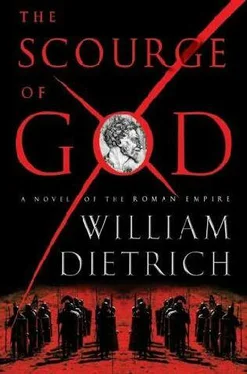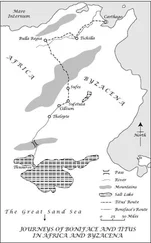William Dietrich - The Scourge of God
Здесь есть возможность читать онлайн «William Dietrich - The Scourge of God» весь текст электронной книги совершенно бесплатно (целиком полную версию без сокращений). В некоторых случаях можно слушать аудио, скачать через торрент в формате fb2 и присутствует краткое содержание. Жанр: Фэнтези, на английском языке. Описание произведения, (предисловие) а так же отзывы посетителей доступны на портале библиотеки ЛибКат.
- Название:The Scourge of God
- Автор:
- Жанр:
- Год:неизвестен
- ISBN:нет данных
- Рейтинг книги:5 / 5. Голосов: 1
-
Избранное:Добавить в избранное
- Отзывы:
-
Ваша оценка:
- 100
- 1
- 2
- 3
- 4
- 5
The Scourge of God: краткое содержание, описание и аннотация
Предлагаем к чтению аннотацию, описание, краткое содержание или предисловие (зависит от того, что написал сам автор книги «The Scourge of God»). Если вы не нашли необходимую информацию о книге — напишите в комментариях, мы постараемся отыскать её.
The Scourge of God — читать онлайн бесплатно полную книгу (весь текст) целиком
Ниже представлен текст книги, разбитый по страницам. Система сохранения места последней прочитанной страницы, позволяет с удобством читать онлайн бесплатно книгу «The Scourge of God», без необходимости каждый раз заново искать на чём Вы остановились. Поставьте закладку, и сможете в любой момент перейти на страницу, на которой закончили чтение.
Интервал:
Закладка:
Hyacinth had become not just Honoria’s servant but also her friend and confidant. In the days after Eugenius’s execution, his arms had comforted her as she had sobbed uncontrollably, his beardless cheek against hers, murmuring agreement as she stoked the flames of hatred for her brother.
The emperor was a beast, his heart a stone, and the prospect of the princess’s marriage to an aging senator in tired Rome was as appalling to the eunuch as it was to his mistress.
Now she had summoned him in the night. “Hyacinth, I am sending you away.”
He blanched. He could no more survive in the outside world than a domestic pet. “Please, my lady. Yours is the only kindness I have known.”
“And sometimes your kindness seems the only that I have. Even my mother, who aspires to sainthood, ignores me until I submit. So we are both prisoners here, dear eunuch, are we not?”
“Until you marry Herculanus.”
“And is that not a prison of another sort?” He sighed. “Perhaps the marriage is a fate you must accept.”
Honoria shook her head. She was very beautiful and enjoyed the pleasures of the bed too much to throw her life away on an old patriarch. The reputation of Herculanus was of a man stern, humorless, and cold. Valentinian’s plan to marry her off would snuff out her own life as effectively as he had snuffed out Eugenius’s. “Hyacinth, do you recall how my mother, Galla Placidia, was taken by the Visigoths after the sack of Rome and married to their chieftain, Athaulf?”
“Before I was born, princess.”
“When Athaulf died, Mother returned to Rome, but in the meantime she had helped civilize the Visigoths. She said once that her few years with them were not too terrible, and I think she has some spicy memories of her first husband.
The barbarian men are strong, you know, stronger than the breed we now have in Italy.”
“Your mother had many strange travels and adventures before assuring the elevation of your brother.”
“She is a woman of the world who sailed with armies, married two men, and looked beyond the palace walls as she now looks to Heaven. She always urged me to do the same.”
“All revere the augusta.”
Honoria gripped her eunuch’s shoulders, her gaze intense. “This is why we must follow her brave example, Hyacinth. There is a barbarian even stronger than the leader of the Visigoths. He is a barbarian stronger than my brother-
a barbarian who is the strongest man in the world. You know of whom I speak?”
Now the eunuch felt the slow dawning of dread. “You mean the king of the Huns.” Hyacinth’s voice was a whisper, as if they were speaking of Satan. The entire world feared Attila and prayed that his plundering eye would fall on some other part of the Empire. Reports said that he looked like a monkey, bathed in blood, and killed anyone who dared stand up to him-except for his wives. He enjoyed, they said, hundreds of wives, each as lovely as he was grotesque.
“I want you to go to Attila, Hyacinth.” Honoria’s eyes gleamed. Strong women relied not just on their wits but also on their alliances with strong men. The Huns had the most terrifying army in the world, and mere word from their leader would make her brother quail. If Attila asked for her, Valentinian would have to let her go. If Attila forbade her marriage to Herculanus, Valentinian would have to accede.
Wouldn’t he?
“Go to Attila!” Hyacinth gasped. “My lady, I scarcely go from one end of Ravenna to the other. I’m not a traveler. Nor an ambassador. I’m not even a man.”
“I’ll give you men as escort. No one will miss you . I want you to find your courage and find him , because both of our futures depend on it. I want you to explain what has happened to me. Carry my signet ring to him as proof of what you say. Hyacinth, my dearest slave, I want you to ask Attila the Hun to rescue me.”
II
Father, what have you done?”
Seven hundred miles east of Ravenna, where the valley of the Danube broadens as that great river nears the Black Sea, the Hun were finally inside a small Roman colonial city called Axiopolis. Like all such Roman cities, it had initially been laid out in the neat grid pattern originating with the legionary camp, its forums, temples, and governing houses placed like board pieces in their logic. Like all such cities, it had been walled in the third century, when wars of unrest grew. Like all such cities, its pagan temples had become churches in the fourth, after Constantine’s conversion to Christianity. And like all such cities it had trembled with unease at each sacking of brethren settlements up the Danube.
Now the Huns were here. Their entry was like the advent of a storm: the sound a rising wail of terror that spread outward from the gates in a siren wave. With the sound came the false dawn of fire, orange and pulsing. In her family’s dining room Ilana tried to shut out what she had dreaded so long to hear: oaths and cries, the clatter of unshod horses on stone paving, the desperate grunts and clangs of futile resistance, and the low hiss and rumble of fire. She glimpsed from the corner of her eye the birdlike flash of an arrow winging down the street, having missed its mark and now on its way to another target at random, a humming hornet in stygian gloom. Her neighbors were running as if from the gates of Hell. The apocalypse had finally come.
“I think I have saved us, Ilana,” Simon Publius said, his voice’s quaver betraying his doubt. The plump merchant had developed a thousand-year-old face in recent weeks, his jowls sagging, his sleep-robbed eyes hollow, his pink skin sweaty and mottled like rancid meat. Now he had bet his family’s survival on treason.
“You opened the gates to them, didn’t you?”
“They would have broken through anyway.” The street was filling with horsemen shouting in a harsh, ugly tongue. Strangely, she could make out the particular noise of swords cutting through the air that sounds like rend-ing fabric and then a deeper thunk when they struck. It was as if all her senses were heightened and she could hear every cry, every whisper, and every prayer. “But we were going to wait for the legions.”
“As Marcianopolis waited? Then there would be no mercy, daughter. I have Edeco’s promise that by aiding him, some of us will be spared.”
There was a shriek and then a gabble of hopeless pleading, making clear that not everyone would be spared. She peeked out. The dark below was filled with fleeing and thrashing forms and the occasional moonlike appearance of a human face, mouth agape in the glare of a torch before it was sucked away. Ilana felt numb. She’d been afraid for so long that it seemed an eternity of fear: frightened for years, really, as horrid tales filtered down the river. Then the para-lyzing dread when the Huns and their allies finally appeared under a plume of smokelike dust, just two weeks ago. They had surrounded Axiopolis at a gallop and threatened annihilation if the city did not surrender.
No such surrender had come, despite the pleas and urging of some. The inhabitants had the pride of Moesia and the fire of Thrace in their veins, and most wanted to fight. There had been brave Roman resistance since: fierce stands; moments of encouraging heroism; and even small, momentary victories. But there had also been a growing hopelessness as the dead and wounded were carried down off the walls, each day seeming grimmer, each night longer, each rumor wilder, each heartbroken widow and orphaned child adding to the city’s fatalism. Incense curled in the churches, prayers echoed up to heaven, priests paraded on the walls, messengers tried to creep away to summon help, and yet no relief arrived. The modest stone walls began to come apart like crumbling cheese. The roofs were pockmarked with fire.
Читать дальшеИнтервал:
Закладка:
Похожие книги на «The Scourge of God»
Представляем Вашему вниманию похожие книги на «The Scourge of God» списком для выбора. Мы отобрали схожую по названию и смыслу литературу в надежде предоставить читателям больше вариантов отыскать новые, интересные, ещё непрочитанные произведения.
Обсуждение, отзывы о книге «The Scourge of God» и просто собственные мнения читателей. Оставьте ваши комментарии, напишите, что Вы думаете о произведении, его смысле или главных героях. Укажите что конкретно понравилось, а что нет, и почему Вы так считаете.












